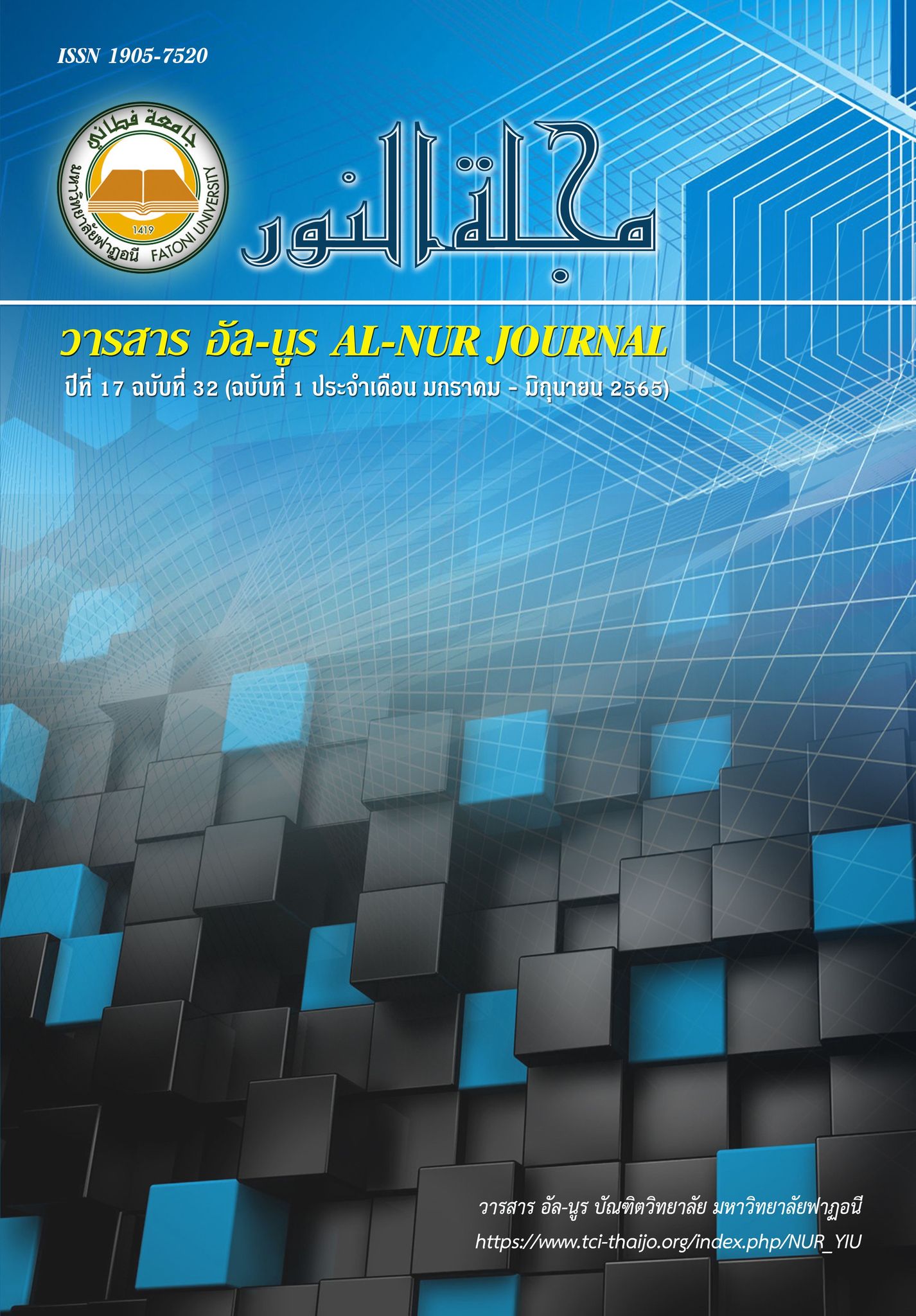แบบแผนการฟื้นฟูอิสลามในประวัติศาสตร์: ระหว่างสนามความรู้และสนามอำนาจ
คำสำคัญ:
การฟื้นฟูอิสสลาม, โลกมุสลิม, ประวัติศาตร์อิสลาม, ขบวนการอิสลาม, อารยธรรมบทคัดย่อ
บทคัดย่อ
จุดประสงค์ บทความวิจัยชิ้นนี้มีเป้าหมายเพื่อศึกษาแบบแผนโดยรวมของการฟื้นฟูอิสลามในหน้าประวัติศาสตร์ ทั้งในสนามความรู้และสนามอำนาจ ผ่านการศึกษาประวัติศาสตร์ของทุกภูมิภาคของโลกมุสลิม เพื่อจะได้เข้าใจการเปลี่ยนแปลงไปของการฟื้นฟูในแต่ละยุคสมัย
วิธีการศึกษา เป็นงานวิจัยเอกสาร โดยการศึกษาการใช้เครื่องมือการฟื้นฟูอิสลามที่เกิดขึ้นในหน้าประวัติศาสตร์ พร้อมกับศึกษาประวัติศาสตร์ที่เปลี่ยนแปลงไป เพื่อสรุป “แบบแผน” ของการฟื้นฟูที่ถูกผลิตออกมาตลอดหน้าประวัติศาสตร์
ผลการศึกษา ผลการศึกษาพบว่า แบบแผนการฟื้นฟูที่เกิดขึ้นตลอดหน้าประวัติศาสตร์ได้รับการตีความที่แตกต่างไปตามบริบทที่เปลี่ยนไป ในยุคแรกเริ่มนั้นเป็นการวางรากฐานปฐมภูมิทางความรู้และการขยายพื้นที่ของดินแดนอิสลาม ในยุคสมัยต่อมาเป็นการตอบโต้ทางวิชาการเพื่อดำรงรักษาคำสอนที่บริสุทธิ์ และมีการตอบโต้การรุกรานจากภายนอกทั้งทางทิศตะวันตกคือสงครามครูเสดและทางทิศตะวันออกคือสงครามกับมองโกล ยุคสมัยต่อมามีการสถาปนาการฟื้นฟูระดับพื้นที่ตามภูมิภาคต่างๆ การปรากฏงานเขียนภาษาใหม่ๆ ของโลกมุสลิม และมีสถาปนาจักรวรรดิที่ยิ่งใหญ่ของโลกมุสลิม ได้แก่ออตโตมันและโมกุล จนกระทั่งมาถึงยุคสมัยของเรา มีการฟื้นฟูการศึกษาใหม่ของโลกมุสลิมผ่านกระบวนการอิสลามศึกษา และมีการสร้างรัฐชาติมุสลิม พร้อมกับการกำเนิดขึ้นของขบวนการเคลื่อนไหวอิสลาม
การนำผลการวิจัยไปใช้ งานวิจัยได้ช่วยทำให้เห็นแบบแผนการฟื้นฟูอิสลามโดยรวมของประชาชาติอิสลาม ทั้งในสนามความรู้และสนามอำนาจ ทำให้เกิดความเข้าใจการเปลี่ยนแปลงไปของการฟื้นฟูในหน้าประวัติศาสตร์และสามารถคาดเดาอนาคตของการฟื้นฟูอิสลามในโลกมุสลิมปัจจุบันได้
เอกสารอ้างอิง
เอกสารอ้างอิง
al-Ash‘arī, Abū al-Ḥasan. 1993. al-Ibānah ‘an Usūl al-Diyānah(الإبانة عن أصول الديانة). al-Qāhirah: Dār al-Anṣār.
al-Bukhārī , Muhammad Ibn Ismā‘īl .1422. Sahīh al-Bukhārī(صحيح البخاري) :al-Muhaqqiq: Muhammad Zahair Ibn Nāsir al-Nāsir. al-Qāhirah : Dār Tawq al-Najāh.
Delong-Bas, Natana J.. 2004. Wahhabi Islam: from revival and reform to global Jihad. Oxford : Oxford University Press.
Esposito, John L. & Voll, John O.. 2001. Makers of Contemporary Islam. New York: Oxford University Press.
Esposito, John L. & Shahin, Emad Eldin. 2018. Key Islamic Political Thinkers. New York: Oxford University Press.
Findley, Carter Vaughn. 2005. Turks in World History. Oxford: Oxford University Press.
al-Ghazālī, Hujjat al-Islām Ahmad. 1966. Tahāfut al-Falāsafah(تهافت الفلاسفة) Tahqiq al-Duktur Sulayman Dunay. 4rd ed. al-Qāhirah: Dār al-Ma‘ārif.
Hoyland , Robert G.. 2015. In God's Path: The Arab Conquests and the Creation of an Islamic Empire . Oxford : Oxford University Press.
Ibn Taymīyah, Ahmad.1987. al-‘Aqīdah al-Wāsitiyah(العقيدة الواسطية). al-Riyad : al-Ri‘asah al-‘ammah li al-IDārat al-Buhut wa al-Ifta’ wa al-Da‘wah wa al-Irshad.
______.1992. Fiqh al-Jihād(فقه الجهاد). Bayrūt : Dār al-Fikr al-‘arbī.
Lewis, Bernard. 1993. The Arab in History. Oxford. Oxford University Press.
al-Nadwī, Abul Ḥasan Alī. .n.d.. Madhā Khasir al-‘Ālam bi al-Inhiṭāṭ al-Muslimīn(ماذا خسر العالم بانحطاط المسلمين). al-Kuwayt : Dār al-Qalam li al-Nashr wa al-Tawzī’.
______.1986. Rijāl al-Fikr wa al-Da‘wah fī al-Islām 1(رجال الفكر والدعوة في الإسلام 1). al-Kuwayt. Dār al-Qalam li al-Nashr wa al-Tawzī’.
Rahman, Fazlur. 2003. Revival and Reform in Islam. Oxford: One World.
Stewart , Desmond. 1967. Great Ages of Man - Early Islam. New Jersey : Time-Life Books.
al-Tirmidhī , Muhammad Ibn ‘Isā. 1975. Sunan al-Tirmidhī (سنن الترمذي ), Tahqiq: Ahmad Muhamad Shākir. al-Qāhirah: Matabat al-Halabī.
ดาวน์โหลด
เผยแพร่แล้ว
ฉบับ
ประเภทบทความ
สัญญาอนุญาต
ลิขสิทธิ์ (c) 2022 Thaweesak Uppama, Abdulroning Suetair

อนุญาตภายใต้เงื่อนไข Creative Commons Attribution-NonCommercial-NoDerivatives 4.0 International License.
Proposed Creative Commons Copyright Notices


